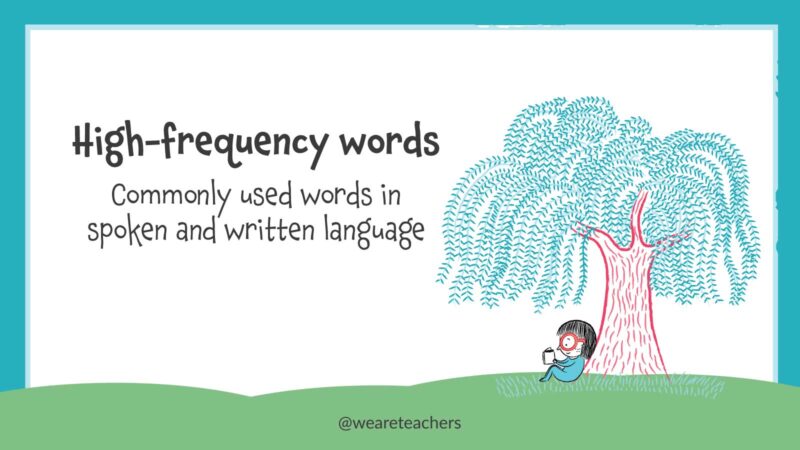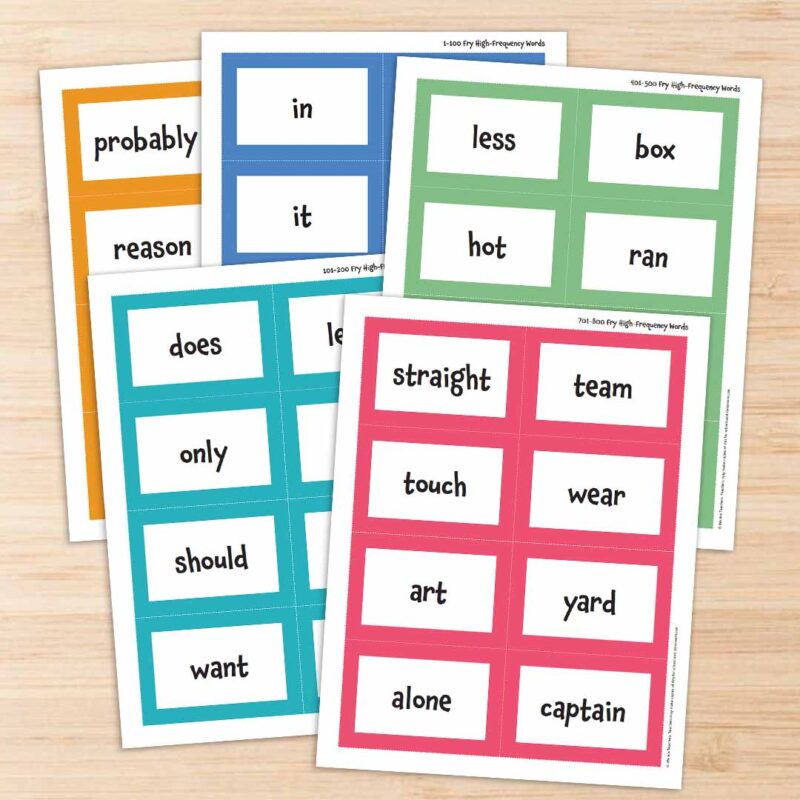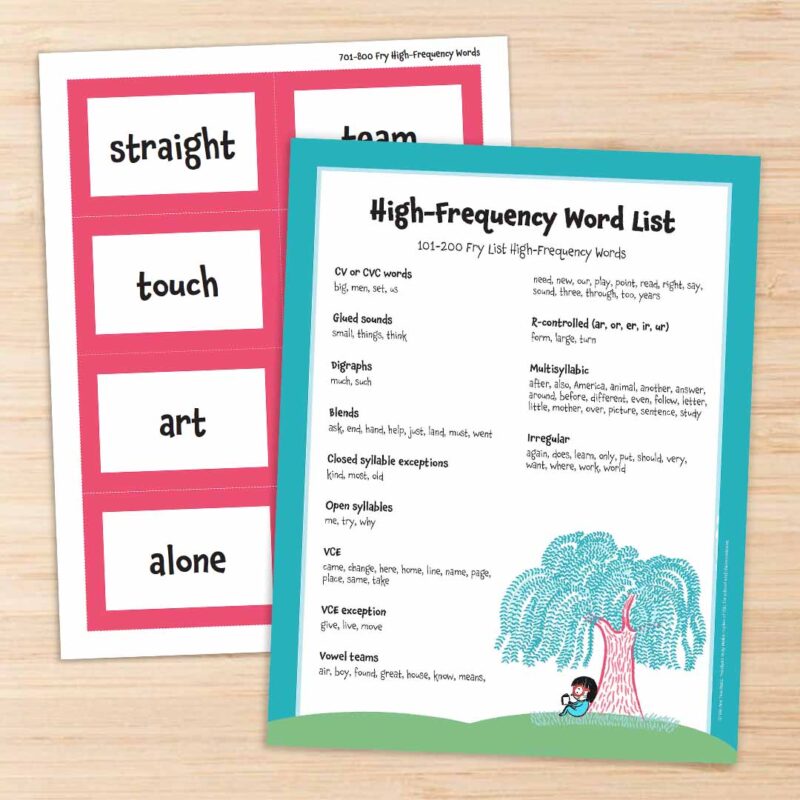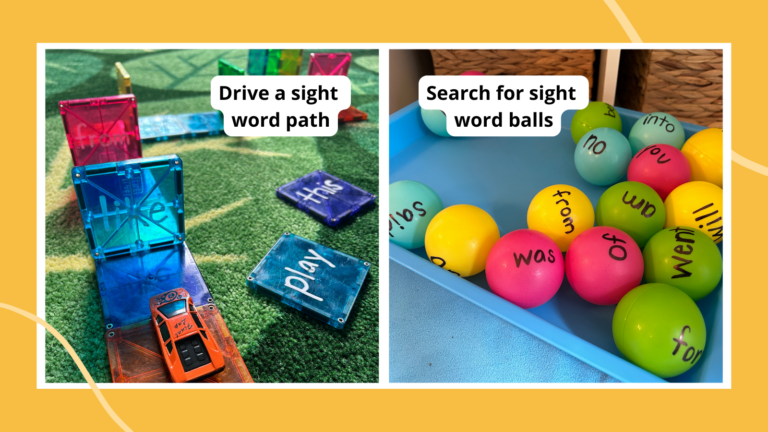Readers repeatedly come across many of the same words when they read. The most commonly used words are called high-frequency words, and they are an essential part of literacy instruction. We’re learning more and more effective ways to teach these words and want to share our best tips for students to read and spell them. While some may be tricky and irregular, many words follow predictable patterns so we can teach kids how to read and spell high-frequency words without memorizing.
Grab our free printable High-Frequency Word Lists and Cards. Then try some of the activities below.
Jump to:
- What are high-frequency words?
- The science of reading and high-frequency word instruction
- Fry Word Lists by Pattern
- 1-100 Fry list words by pattern
- 101-200 Fry list words by pattern
- 201-300 Fry list words by pattern
- 301-400 Fry list words by pattern
- 401-500 Fry list words by pattern
- 501-600 Fry list words by pattern
- 601-700 Fry list words by pattern
- 701-800 Fry list words by pattern
- 801-900 Fry list words by pattern
- 901-1000 Fry list words by pattern
- How To Use the Word Lists and Cards
What are high-frequency words?
High-frequency words are those most commonly found in written language. Often they are used synonymously with sight words, but there’s an important distinction between these two terms. A high-frequency word can be irregular and may require the reader to read it automatically without sounding it out. Or it can be a word that is phonetically regular but is commonly used, like “me.” Sight words refer to words we read automatically without decoding or breaking the sounds apart.

Any word can be a sight word. The more proficient you become as a reader, the more words you can read by sight. Prioritizing teaching high-frequency words can significantly increase sight word knowledge. And as students learn more of these words by sight, they can access a larger amount of text, which in turn increases their literacy skills.
Thirteen words make up a quarter of all of the words that kids read, and roughly 100 words make up 50% of text. That’s so few words! So, learning these words early is hugely beneficial for learning how to read and building fluency as readers become more skilled. We can help our earliest readers by teaching them the most commonly used words while we are also teaching them how to decode basic patterns.
Some of those are decodable based on a student’s ability to read words. Being able to read these few words will greatly improve a student’s ability to read given how often they occur.
How has the science of reading changed high-frequency word instruction?
The science of reading has helped us understand that there are more efficient and helpful tools for learning high-frequency words aside from simply memorizing them. Recent research suggests that if we can point out predictable patterns, students can use their letter-sound knowledge to recognize and spell high-frequency words more effectively. Some very common words, like “of” or “who,” are highly irregular and can be taught using memorization, but a surprising number of high-frequency words are actually phonetically regular and predictable.

Fry Word Lists by Pattern
Two popular high-frequency word lists are the Dolch and the Fry. Both lists were created decades ago to distinguish the most commonly occurring words in written text. We took all 10 Fry lists and broke them up by pattern so you can easily teach students these words. There are 1,000 words total, which encompass 90% of all written words. Typically, first graders should learn the first 100, second graders the second list, third graders the third, and the last seven lists can be mastered in fourth and fifth grades.
We often assume high-frequency words don’t follow the rules, but roughly two-thirds of the words on the top 100 list are actually decodable and predictable. Breaking them into categories based on patterns is a more effective method than simply having students memorize all the high-frequency words.
Even irregular words have predictable elements we can use to help students remember them better. For example, in the word “could,” the first and last consonant sounds are predictable.
Just a note: Along with separating these words out by pattern and syllable types, we list the irregular words for each Fry list. There is some subjectivity to which ones are irregular, because almost all words have some predictable elements. Feel free to teach them however you see fit!
Also, each subsequent list contains more words with multiple syllables. For more advanced readers, it may make sense to split these up further into syllable patterns.

1–100 Fry List High-Frequency Words
CV or CVC words: and, an, am, as, at, big, but, can, did, dog, get, had, has, him, his, if, in, is, it, its, will, on, not, up, us, yes
Glued sounds: all
Digraphs: than, then, them, when, with, this, that, which
Closed exception: find, most
Glued sounds: long
Open syllables: a, be, by, go, he, I, my, no, so, she, we
VCE: like, made, make, these, time, use, write
Vowel teams: day, down, each, how, look, may, now, out, see, way
R-controlled (ar, or, er, ir, ur): are, for, first, fur, her, more, or, part, were
Multisyllabic: about, number
Suffixes: called
Irregular: of, to, you, was, are, they, have, from, one, what, were, your, there, their, said, do, many, some, would, other, into, two, could, been, who, people, come, water, words
101–200 Fry List High-Frequency Words
Closed syllables: tell, well
CV or CVC words: big, men, set, us
Glued sounds: small, things, think
Digraphs: much, such
Blends: ask, end, hand, help, just, land, must, went
Closed syllable exceptions: kind, most, old
Open syllables: me, try, why
VCE: came, change, here, home, line, name, page, place, same, take
VCE exception: give, live, move
Vowel teams: air, boy, found, great, house, know, means, need, new, our, play, point, read, right, say, sound, three, through, too, years
R-controlled (ar, or, er, ir, ur): form, large, turn
Multisyllabic: after, also, America, animal, another, answer, around, before, different, even, follow, letter, little, mother, over, picture, sentence, study
Irregular: again, does, learn, only, put, should, very, want, where, work, world
201–300 Fry List High-Frequency Words
Closed syllables: add, it’s, miss
CV or CVC words: cut, got, let, run
Glued sounds: song
Digraphs: watch, white
Blends: last, left, list, next, plant, stop
VCE: close, face, late, life, mile, side, state, those
Vowel teams: book, earth, eat, feet, food, group, grow, head, hear, high, keep, leave, light, might, near, night, own, real, saw, school, sea, seem, soon, story, thought, took, tree, young
R-controlled (ar, or, er, ir, ur): car, far, girl, hard, start
Multisyllabic: above, almost, always, began, begin, being, below, between, children, city, country, every, example, family, father, idea, important, mountains, never, often, open, paper, river, second, under, until, without
Irregular: carry, don’t, enough, eyes, four, Indian, once, something, sometimes, talk, together, walk
301–400 Fry List High-Frequency Words
Closed syllables: I’ll
CV or CVC words: dog, map, red, sun, top
Glued sounds: fall, king, sing
Digraghs: black, fish, rock, ship
Blends: best, plan, stand, step, wind
Closed syllable exceptions: cold, hold, told
VCE: five, since, space, voice, whole
Vowel teams: draw, field, fire, ground, knew, low, piece, room, seen, south, true, wood, voice, whole
R-controlled (ar, or, er, ir, ur): birds, door, farm, horse, mark, north, short
Multisyllabic: across, against, area, become, better, body, certain, color, complete, covered, didn’t, during, early, easy, ever, figure, happened, himself, however, hundred, listen, measure, money, morning, music, notice, numeral, order, pattern, problem, products, questions, remember, several, table, today, travel, unit, upon
Suffixes: cried, passed, pulled, reached, slowly, waves
Irregular: friends, heard, sure, toward, usually, war
401–500 Fry List High-Frequency Words
Closed syllables: less
CV or CVC words: box, hot, ran, six, ten, yes, yet
Glued sounds: ball, bring, strong
Digraphs: check
Blends: class, fact, rest
Open syllables: dry, fly
VCE: base, fine, game, gave, note, plane, rule, shape, size
Vowel teams: boat, bread, brought, clear, deep, feel, green, heat, known, noun, pair, road, round, shown, stay, stood, street, though, wait
R-controlled (ar, or, er, ir, ur): dark, force, verb
Multisyllabic: able, ago, among, became, behind, cannot, circle, common, contain, English, equation, explain, heavy, include, inside, machine, object, person, power, produce, special, surface, system
Suffixes: building, carefully, decided, filled, finally, government, inches, quickly, scientists, stars, thousands, understand, wheels
Irregular: built, course, done, front, full, half, island, language, material, minutes, ocean, oh
501–600 Fry List High-Frequency Words
Closed syllables: can’t, edge, length
CV or CVC words: job, sat, sum
Glued sounds: shall, wall
Digraphs: wish
Blends: drop, felt, grass, held, kept, mind, past, soft, test
Open syllables: sky
VCE (magic E): dance, drive, race, site, square, store, wide
Vowel teams: blue, cause, lay, main, meet, moon, paint, rain, root, sign, train
R-controlled (ar, or, er, ir, ur): third
Multisyllabic: believe, beside, brother, center, describe, difference, direction, distance, energy, exercise, forest, general, instruments, matter, million, paragraph, perhaps, present, probably, ready, reason, record, region, represent, return, simple, subject, summer, teacher, whether, window, winter, written
Suffixes: arms, cells, clothes, developed, discovered, divided, eggs, farmers, finished, flowers, legs, members, months, picked, raised, suddenly, syllables
Irregular: anything, beautiful, Europe, heart, love
601–700 Fry List High-Frequency Words
Closed syllables: hill, let’s
CV or CVC words: bed, cat, lot, son
Glued sounds: spring, tall
Blends: act, cross, dress, French, milk, trip
Closed syllable exceptions: gold
VCE: age, care, case, hole, ice, lake, phrase, quite, scale, solve, stone, type
Vowel teams: bear, bright, count, fight, free, hair, lead, sail, sleep, snow, soil, speak, speed
R-controlled (ar, or, er, ir, ur): floor, per, poor
Multisyllabic: Africa, already, amount, angle, appear, baby, bottom, broken, century, consonant, copy, dictionary, either, everything, fraction, instead, iron, natural, melody, metal, method, middle, moment, nation, outside, quiet, remain, result, section, surprise, temperature, tiny, village, within, wonder
Suffixes: died, exactly, factors, fingers, jumped, killed, possible, pounds, pushed, rolled, smiled, themselves
Irregular: build, buy, couldn’t, everyone, laughed, someone
701–800 Fry List High-Frequency Words
Closed syllables: catch, fell
CV or CVC words: bad, bit, gas, God
Glued sounds: bank, ring
Digraphs: stick
Blends: cost, glass, sent, skin,
Closed syllable exceptions: child, lost
VCE: else, rise, save, serve, strange, wire, wrote
Vowel teams: break, brown, caught, choose, clean, cloud, coast, cool, east, flow, foot, key, law, least, mouth, pay, please, row, straight, team, touch, wear
R-controlled (ar, or, er, ir, ur): art, yard
Multisyllabic: alone, captain, control, decimal, desert, design, direct, engine, England, equal, experiment, express, garden, history, human, increase, information, itself, lady, maybe, party, period, practice, president, report, separate, single, trouble, uncle, valley, visit, woman
Suffixes: burning, cents, climbed, continued, drawing, ears, feeling, hunting, joined, plains, received, seeds, shouted, statement, students, symbols
Irregular: business, whose, you’re, yourself
801–900 Fry List High-Frequency Words
Closed syllables: bell, sell
CV or CVC words: fit, fun, hat, hit
Glued sounds: mall, string
Digraphs: block, rich, thick, thin, thus, wash
Blends: flat, sand, send, spot, swim
VCE: mine, pole, safe, sense, tone, trade, wife
Vowel teams: blood, blow, chief, book, crowd, eight, fruit, lie, loud, meat, sight, spread, stream, weight
R-controlled (ar, or, er, ir, ur): park, sharp
Multisyllabic: addition, army, belong, cattle, compare, compound, consider, corner, current, doctor, electric, enjoy, except, expect, famous, indicate, industry, Japanese, major, modern, necessary, observe, particular, poem, position, process, property, provide, rather, science, seven, shoulder, silent, supply, value
Suffixes: bones, branches, crops, dollars, elements, entered, exciting, insects, interesting, lifted, movement, planets, soldiers, suggested, terms, tied, wings
Irregular: guess, rhythm, wasn’t, won’t
901–1000 Fry List High-Frequency Words
Closed syllables: match
CV or CVC words: fig, gun, led, win
Glued sounds: wrong
Digraphs: fresh, shop, track, truck
Blends: isn’t, smell
Open syllables: we’ll
VCE: chance, France, huge, nose, rope, rose, score
Vowel teams: bought, dead, deal, death, fair, Greek, hoe, seat, steel, view
R-controlled (ar, or, er, ir, ur): born, chart, church, corn, march, sir
Multisyllabic: action, adjective, afraid, ahead, allow, apple, British, capital, column, company, cotton, create, details, determine, difficult, division, effect, entire, especially, evening, experience, forward, level, office, opposite, oxygen, plural, radio, similar, sister, solution, suffix, triangle, underline, various, Washington, women, yellow
Suffixes: actually, agreed, arrived, conditions, cows, factories, located, molecules, northern, prepared, printed, repeated, settled, shoes, southern, stretched, substances, total, western, workers
Irregular: doesn’t, pretty, sugar, wouldn’t
How To Use the Word Lists and Cards

There are so many ways to use these high-frequency words in your instruction. Here are a few of our favorite games and activities to incorporate early and often.
Heart Word Magic
These Heart Word Magic videos from Really Great Reading are great tools for helping students remember high-frequency words and map out the predictable parts of irregular words.
Use Meaningful Applications
When introducing new high-frequency words to students, it can be helpful to add meaning for students and give context for new learning. Students in any grade can use new words in a sentence. Older students can look up the words in a dictionary and learn about their origin.
Find the Fish
There are so many fun games to reinforce automaticity with high-frequency words. One of our tried-and-true favorites is Find the Fish. All you need is a small cut-out fish or other animal you can create yourself (or enlist your students’ help!) and flash cards of target words. Place the cards face up and hide the fish underneath one of the cards. Students take turns reading a word, and if they read it correctly, they flip it over to see if they’ve found the fish. Keep going until you find the fish and then repeat the game.
Keep a Word Journal
Students can keep track of words they’ve learned in a journal or notebook. They can refer to it when writing, and it’s a great way to build on previous learning and to review over the course of the school year.
Get Your Free High-Frequency Word Printables

Print copies of all the word lists and cards to keep on hand for spelling lists, teaching examples, and for games and activities like the ones above.

